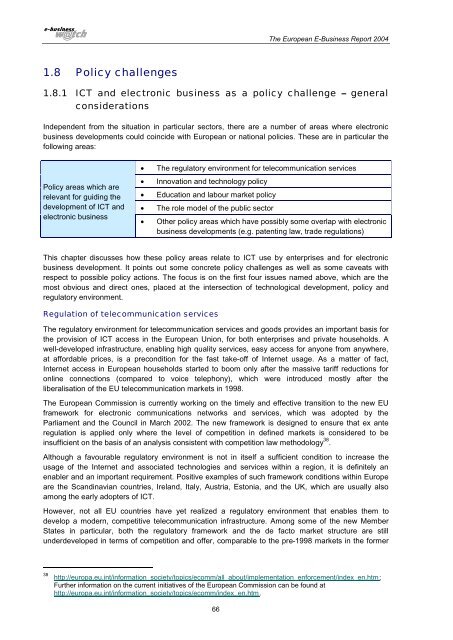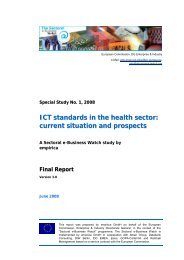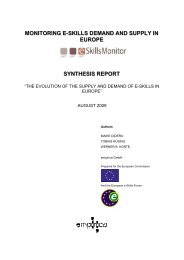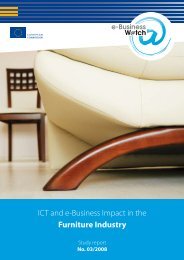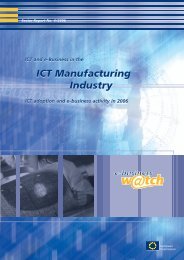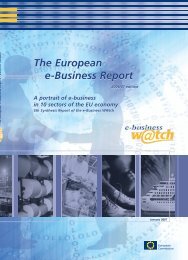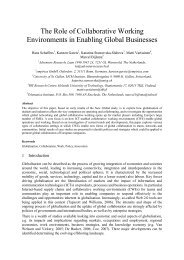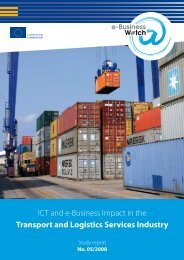The European e-Business Report 2004 - Berlecon Research GmbH
The European e-Business Report 2004 - Berlecon Research GmbH
The European e-Business Report 2004 - Berlecon Research GmbH
Create successful ePaper yourself
Turn your PDF publications into a flip-book with our unique Google optimized e-Paper software.
<strong>The</strong> <strong>European</strong> E-<strong>Business</strong> <strong>Report</strong> <strong>2004</strong>1.8 Policy challenges1.8.1 ICT and electronic business as a policy challenge – generalconsiderationsIndependent from the situation in particular sectors, there are a number of areas where electronicbusiness developments could coincide with <strong>European</strong> or national policies. <strong>The</strong>se are in particular thefollowing areas:Policy areas which arerelevant for guiding thedevelopment of ICT andelectronic business• <strong>The</strong> regulatory environment for telecommunication services• Innovation and technology policy• Education and labour market policy• <strong>The</strong> role model of the public sector• Other policy areas which have possibly some overlap with electronicbusiness developments (e.g. patenting law, trade regulations)This chapter discusses how these policy areas relate to ICT use by enterprises and for electronicbusiness development. It points out some concrete policy challenges as well as some caveats withrespect to possible policy actions. <strong>The</strong> focus is on the first four issues named above, which are themost obvious and direct ones, placed at the intersection of technological development, policy andregulatory environment.Regulation of telecommunication services<strong>The</strong> regulatory environment for telecommunication services and goods provides an important basis forthe provision of ICT access in the <strong>European</strong> Union, for both enterprises and private households. Awell-developed infrastructure, enabling high quality services, easy access for anyone from anywhere,at affordable prices, is a precondition for the fast take-off of Internet usage. As a matter of fact,Internet access in <strong>European</strong> households started to boom only after the massive tariff reductions foronline connections (compared to voice telephony), which were introduced mostly after theliberalisation of the EU telecommunication markets in 1998.<strong>The</strong> <strong>European</strong> Commission is currently working on the timely and effective transition to the new EUframework for electronic communications networks and services, which was adopted by theParliament and the Council in March 2002. <strong>The</strong> new framework is designed to ensure that ex anteregulation is applied only where the level of competition in defined markets is considered to beinsufficient on the basis of an analysis consistent with competition law methodology 38 .Although a favourable regulatory environment is not in itself a sufficient condition to increase theusage of the Internet and associated technologies and services within a region, it is definitely anenabler and an important requirement. Positive examples of such framework conditions within Europeare the Scandinavian countries, Ireland, Italy, Austria, Estonia, and the UK, which are usually alsoamong the early adopters of ICT.However, not all EU countries have yet realized a regulatory environment that enables them todevelop a modern, competitive telecommunication infrastructure. Among some of the new MemberStates in particular, both the regulatory framework and the de facto market structure are stillunderdeveloped in terms of competition and offer, comparable to the pre-1998 markets in the former38http://europa.eu.int/information_society/topics/ecomm/all_about/implementation_enforcement/index_en.htm;Further information on the current initiatives of the <strong>European</strong> Commission can be found athttp://europa.eu.int/information_society/topics/ecomm/index_en.htm.66


